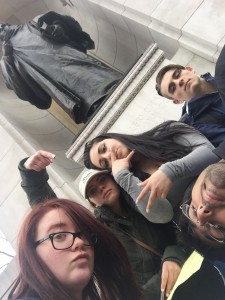
Benjamin Butler walked out these doors in January 1884. Thank god.


Elizabeth Palmer Peabody, the grandmother of Boston, used to own this shop. It’s now a Mexican restaurant.

We were going to lay down on it, but there was feces and other questionable substances already there 🙁

Oneida Football Memorial! This one took forever to find. (I’m taking the picture, this one was hard to selfie).

56570 mines were in the North Sea during World War II!

We wandered the Commons shouting out Pat Toomey’s name for a solid few minutes before this guy stopped his cart. Turns out, Pat Toomey had the day off, but his best friend was willing to take a picture with us!

The Pagets began the Swan Boat business a long time ago, but they’re still going strong. The lines were crazy today so we opted out of riding!

This is the album cover for when we eventually decide to enter the music scene. Homie’s got us covered with his mad Unitarian views.

We got lost for 20 minutes before we finally figured out it was on the other side of the Common. Turns out being lost can make you look a little like a serial killer (sorry haha my eyes are really bugging in this one :’) )

Emancipation Proclamation is where it’s at. Lincoln knew what he was talking about. Revolutionary.

AAAAND we made it to the end!! It was a fun journey!